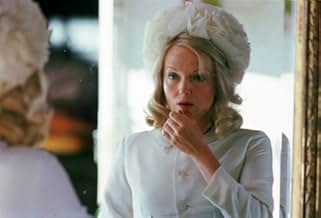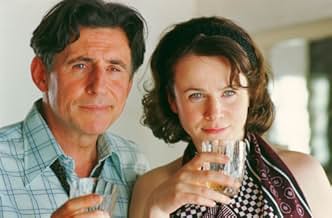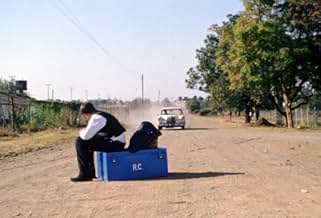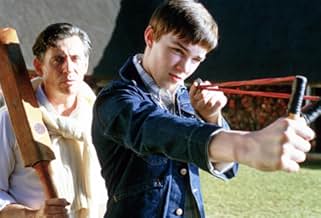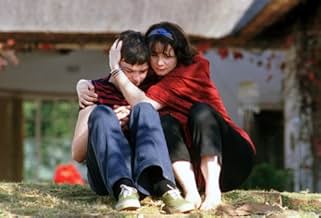Agrega una trama en tu idiomaRalph witnesses the disintegration of his parents' marriage through adultery and alcohol during the last gasp of the British Empire in Swaziland in 1969. Ralph finds his new step-mother is t... Leer todoRalph witnesses the disintegration of his parents' marriage through adultery and alcohol during the last gasp of the British Empire in Swaziland in 1969. Ralph finds his new step-mother is the only one who understands his inner turmoil.Ralph witnesses the disintegration of his parents' marriage through adultery and alcohol during the last gasp of the British Empire in Swaziland in 1969. Ralph finds his new step-mother is the only one who understands his inner turmoil.
- Dirección
- Guionista
- Elenco
- Premios
- 5 nominaciones en total
- Dirección
- Guionista
- Todo el elenco y el equipo
- Producción, taquilla y más en IMDbPro
Opiniones destacadas
The second striking feature of the movie is the portrait of a small but immensely snobbish colonial society that was about to disappear. Appearances are everything so clandestine adultery is condoned but divorce very much disapproved of. Outsiders (for example Harry Compton's new American wife Ruby) are scarcely tolerated. This stern moral code was hardly needed to impress the natives, who were polygamous. The choice of "Camelot" as the entertainment put on by the denizens of the white social club for the Independence celebrations is ironically appropriate for some of the whites it was indeed Camelot, and now it was about to end.
Another theme of Grant's is growing up, generally a painful experience with or without dysfunctional parents. Here he is greatly helped by a fine performance from Nicholas Hoult as the 14 year old Richard ("Ralph" in the film). Miranda Richardson as the errant mother and Gabriel Byrnes as the father are also excellent and there are strong performances from the supporting cast, particularly Julie Walters as a deserted wife and Celia Imrie as the impossibly snobbish High Commissioner's wife. I'm not sure why, but Emily Watson's Ruby was only so-so. The people of Swaziland don't get much of a look-in this is white mischief after all, but the actor who plays the warm-hearted local doctor (John Matshikiza?) should get an honorable mention.
Since independence Swaziland has not done too well; according to Wikipedia it now has 39% of the adult population with HIV and the world's lowest life expectancy -32.6 years. The combined rule of the present king and "Great She-Elephant" (his mother) has not been a conspicuous success. The colonial days, which took the light form of a British Protectorate, must seem like Camelot even to the Swazis. This movie seems to have captured the atmosphere of the time as well as the pains of growing up.
Before the film I was promised it would make me cry, laugh and be totally delighted with what I saw.
The tears come from some very moving moments between Ralph (Nicholas Hoult) and his father as they try to maintain a relationship despite his father's drinking problems, depicted by a very frightening and convincing Gabriel Byrne. Ralph's struggle to accept his father's new wife, played by Emily Watson, also gives us a good dose of emotional moments, of which this film is certainly not short!
The laughter comes mostly from some moments of brilliantly over-the-top British snobbery and Emily Watson's spot-on mockery of it. Incidentally, this is what gives the film its title - "Wah-Wah" being her imitation of upper class speech.
And the delightfulness comes from everything about the film - a sentimental and touching story set amongst beautiful scenery, with a lovely score and stunning performances from all the cast. Having spent 5 years on this film, it is clearly very personal to Grant and it seems all that time was worth it. The promise was fulfilled - delight, laughter and tears.
¿Sabías que…?
- TriviaThe teacher in the school scene actually taught history to Writer and Director Richard E. Grant at school in the same classroom where the scene takes place.
- ErroresThe movie supposedly starts in 1969 with the date appearing on the screen. Yet Swaziland received independence on 6 September 1968.
- Citas
Lauren Compton: How dare you contradict me in front of a servant?
Harry Compton: The Sphinx has spoken.
- ConexionesFeatured in Wah Wah in Swaziland (2005)
- Bandas sonorasGoodnight Sweetheart
Written by Ray Noble, Jimmy Campbell & Reginald Connelly
Performed by Ray Noble and his Orchestra
Vocalist: Al Bowlly
Selecciones populares
- How long is Wah-Wah?Con tecnología de Alexa
Detalles
Taquilla
- Presupuesto
- USD 7,000,000 (estimado)
- Total en EE. UU. y Canadá
- USD 234,750
- Fin de semana de estreno en EE. UU. y Canadá
- USD 55,304
- 14 may 2006
- Total a nivel mundial
- USD 2,846,148
- Tiempo de ejecución
- 2h(120 min)
- Color
- Mezcla de sonido
- Relación de aspecto
- 2.35 : 1


